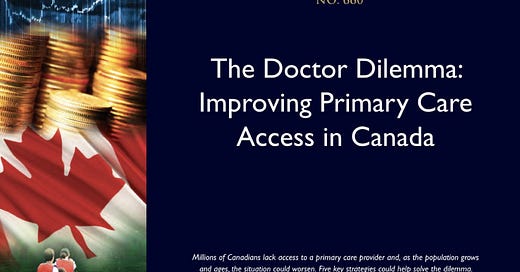PRIMARY CARE PARADOX: IMPROVING ACCESS REQUIRES CHANGING THE STATUS QUO
The abstract published below was written by Tingting Zhang, Junior Policy Analyst, C.D. Howe Institute; and Lauren Malyk, Senior Communications Officer, C.D. Howe Institute.
WHO is Responsible?
This analysis and commentary from the C.D.Howe concerns a public health problem that is fully the creation of government central planners. Sadly, the proposed solutions also fall under the authority of the same government central planners.
By contrast, central planning is absent in free markets. The tried and true supply and demand dynamics provide all of the economic signals needed for market actors to meet the needs of customers.
Citizens, and their consumer choices, ARE their own planners. Every dollar they spend adds a data point in a massive unseen mountain of market data which producers study to determine how much product or service to supply to the market and at what price levels.
Supply and Demand is a foundational concept in ECONOMICS 101.
I guess our governments’ central planners missed that class.
Instead of planning and controlling entire sectors of the economy, such as health care, the only acceptable government roles are to PROTECT and SERVE, NOT IMPOSE.
The duties of governments must be limited to:
Acknowledge and respect that every person possesses the INALIENABLE ASSETS of BODY, MIND and WILL. With these assets, each person deserves the right to any property that they justly create, build, earn or acquire legitimately.
Protect every person from direct and indirect harms, aggressions or threats against their rights by any other person, group, institution, company or cause. This includes protection from any foreign power or actor such as the World Health Organization, or by any agent of government or the courts that attempts to usurp the sovereign rights of each individual citizen.
Maintain and manage PUBLIC PROPERTY and COMMON ASSETS in a way that respects and protects every citizen’s rights in those assets;
Create, maintain or support essential infrastructure and services which serve the needs of all citizens and that can’t be adequately provided without government involvement or funding. Health care, for example, could be provided without government involvement, or by some combination of governmental and non-governmental service providers in a competitive market. The latter is common in Europe.
Ensure that no statute, regulation, policy, program or action of government harms the rights and freedoms or the property of any citizen. Provide citizens with an effective means to prevent abuses of government powers and to hold personally accountable any guilty party.
Secure the rights of citizens to provide for themselves and their family.
Assist with the essential needs of those who can’t help themselves, with the aim of encouraging self reliance;
The C.D. Howe media announcement.
https://x.com/cdhoweinstitute/status/1793654665915023705?s=61
May 23, 2024 - Canada has the highest number of general practitioners per capita, a new study from the C.D. Howe Institute has found, and the lowest access among comparator countries. This lack of access to family physicians is quickly becoming a critical issue in Canada, with millions of Canadians lacking access to a primary care provider.
In “The Doctor Dilemma: Improving Primary Care Access in Canada,” author Tingting Zhang investigates this paradox and reports on recent provincial progress in implementing strategies to improve access to primary care. She analyzes the supply and demand for family physicians in Canada and highlights five well-established strategies for improving access to primary care, all of which the provinces are pursuing to varying degrees.
“Addressing primary care access challenges with many interrelated contributing factors is a challenge for policymakers,” states Zhang. “Canada requires a comprehensive approach that combines strategies to improve access to primary care.”
Without changes to the status quo, the analysis shows the gap between the supply of and demand for family physicians is likely to grow. Many factors contribute to current primary care access challenges. Similar to the population, the physician workforce is aging and there are not enough new medical graduates to both replace retiring physicians and take on the growing population of patients that don’t have a regular family practitioner. Physicians have also been spending fewer hours on direct patient care over time. Unnecessary administrative work, in particular, requires about 18.5 million hours of physician time every year in Canada, equivalent to 55.6 million patient visits. In addition, economic and cultural factors contribute to medical trainees preferring to specialize instead of opening up general family practices.
The report examines five well-established strategies for improving primary care access and summarizes recent provincial policy actions to implement them:
Expanding the number of training positions for prospective family doctors and accelerating pathways for international medical graduates to enter family medicine, whether direct-to-practice or through access to residency positions;
Reducing the administrative burden for family physicians;
Providing alternate payment models;
Expanding the scope of practice of other primary care providers; and
Expanding team-based models of care.
Some provinces have only taken limited steps to improve primary care access, such as Quebec in expanding scopes of practice for non-physician healthcare professionals to provide some primary care. Other provinces, such as Nova Scotia, are implementing more comprehensive strategies to address primary care access challenges. Improving access to primary care is a challenge across the country. Comparing and contrasting the policies across provinces shows that some provinces are taking more aggressive actions to improve than others.
The C.D. Howe Institute is an independent not-for-profit research institute whose mission is to raise living standards by fostering economically sound public policies. Widely considered to be Canada's most influential think tank, the Institute is a trusted source of essential policy intelligence, distinguished by research that is nonpartisan, evidence-based and subject to definitive expert review.




